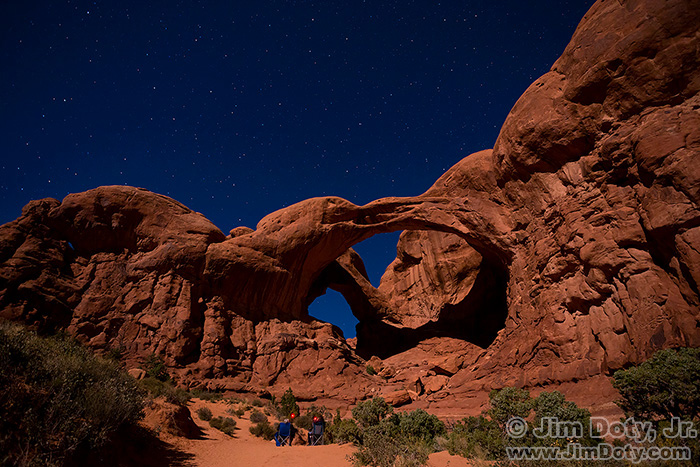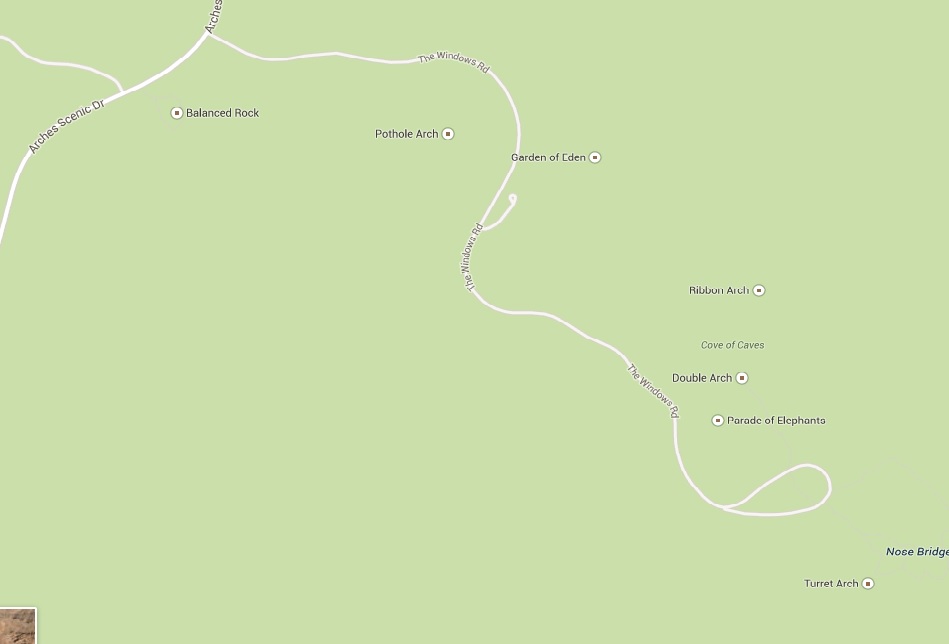Bob, my brother-in-law, and I were in the Double Arch/”Windows” area at Arches National Park. As we made our way down the trail we saw two red lights in the distance. It was our guess it was the red lights on the back of two cameras, glowing in the darkness during long time exposures.
It was too dark for our eyes to tell for sure, but that is not a problem for cameras which can accumulate light over time. So before we walked up to whoever it was, I put my camera on a tripod and took a picture. There on the back of my camera I could see two people sitting in lawn chairs while there camera took long exposures of the night time landscape.
We walked up and said hello. They were two women from Australia on the last week of a 6 week photo trip across the U.S. This was there second night at Arches National Park. The prior night they had been taking 30 – 60 minute exposures of stars trailing across the desert sky. This night they were doing shorter exposures.
There were 10 photographers (counting us) taking pictures in the area. 4 were up by the Windows and 6 were at Double Arch. You could see the faint red glow of the lights on their cameras. The temperature in the parking lot was 54 (F) but the air was dead calm, and even in my short sleeved shirt it was very pleasant at Double Arch. It occurred to me later that the red sandstone rock faces were probably radiating heat they had gathered all day long, making it warmer than it was in the parking lot.
Thanks to the “Purkinje effectâ€, the human eye can’t see warm colors at night. But cameras can still record these colors. While everything looks dark and cool in color to your eyes, during a long exposure your camera keeps accumulating light your eyes can’t see.
If you are after stars and constellations with minimal star movement, use the “Rule of 600”. Divide the number 600 by the focal length of your lens to get the maximum exposure time in seconds that you can use and still minimize star movement. For this photo I was using a 17mm focal length. 600 divided by 17 is roughly 30 seconds (32.3 actually, but 30 is close enough).
High ISO settings are the rule to capture moonlight on the landscape along with the stars. The moon was just past first quarter so I used ISO 1600 to get a 30 second shutter speed. I stopped the lens down to f/5.6 from its maximum aperture of f/4. Most lenses aren’t at their best wide open so I usually stop a lens down by one stop when doing night photography.
To get to the Windows Area (which includes Double Arch), turn right just past Balanced Rock and follow the Windows Road to the loop. There are parking areas on the north and south side of the loop and vault toilets in the middle of the loop. North and South Windows and Turret Arch are a short walk southwest of the loop. Double Arch is a short walk northwest of the loop.
Moab, Utah is the place to stay. Arches is just a few miles north of town. When in Moab I stay at the River Canyon Lodge. Clean, nice. Good beds. Rooms aren’t huge but I am only in the room to sleep. Read the reviews on Trip Advisor. Link below.
Don’t miss Dead Horse Point State Park and Canyonlands National Park while you are in Moab. Links below.
Stop by Tom Till’s gallery on Main Street and check out his beautiful work.
Photo Data: Canon 5D Mark III. Canon EF17-40mm f/4L USM lens at 17 mm. 30.0 sec, f/5.6, ISO 1600.
Links
Colors Your Eyes Can’t See – night photography and the “Purkinje effectâ€.
For more information on night and low light photography, landscape photography, and a whole lot more, read my book Digital Photography for Dummies, one of the highest rated photography books at Amazon. More information here and you can order it at Amazon.com.
Arches National Park – the official NPS site.
Dead Horse Point State Park – the official site.
Canyonlands National Park – the official NPS site.
Moab Utah – the official tourism site with a lot of information.
Tom Till Gallery – 61 North Main, Moab.
River Canyon Lodge in Moab. Call and ask for their best rate. They will often beat the best price you can find online. A nice place to stay and less expensive than a lot of other places in Moab.


